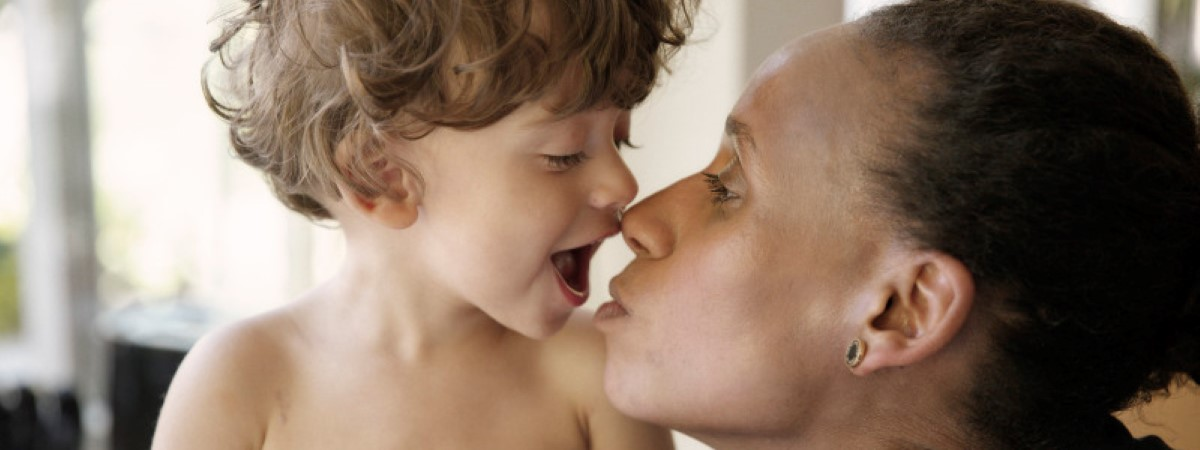Language development in children
It might just sound like a lot of cute but incoherent babbling for the most part, but from the very first moment your child starts making sounds, he or she is practising communication. The older children get, the more common it is for them to experiment with new sounds and words more or less all the time. They listen, they learn and they absorb everything like a little sponge. Reading, singing and talking to your child are therefore excellent ways to aid his or her language development.
Even though a child may have already uttered his or her first words, it is not until children are around two to three years of age that they usually start being able to put together short sentences with a couple of words and take part in basic conversations. As children approach the age of three, many of them are able to put together sentences with up to six words. That said, it is of course important to remember that all children are different, and the same applies to their language development. There are children who don’t talk at all at the age of three but then suddenly open their mouth and display excellent language development from their very first sentence. Others babble on and are perhaps able to make themselves understood to those in their innermost circle, but outsiders – unable to tune in to the right frequency – have no chance of understanding what the child wants.
Language is a major part of how we interact with each other, and we, as parents, therefore perhaps want to go the extra mile in supporting our children’s language development. It may, however, be comforting to know that, for the most part, it is usually sufficient just to engage in a lot of chit-chat with your child in everyday life – something that most parents and children do completely automatically. As human beings, we are made to communicate, and the more language children are exposed to in their surroundings, the more they will absorb and learn. At the same time, we are all different as people, and there is a great deal of individual variation between us when it comes to our language – some of us are very verbal, while others are more taciturn. A person’s innate personality and verbal capacity also impacts the extent of their language development, both as a child and as an adult.
Language stimulation in everyday life
For parents who like words and want to provide a little boost to their child’s language development, here are a few tips on fun ways to stimulate a child’s use of language in everyday life.
- A day in your life
When it is time for bed, tell your child a story about everything that has happened or that you have done together during the day. This provides good training in the ability to place things in the right order and recall and recount events and happenings. - What, who and how?
You can take turns asking each other questions. Try to ask open-ended questions that require more than just a yes-or-no answer, and listen to each other. This also provides you with a golden opportunity to listen to your little one’s thoughts. - “Odd One Out”
This is a game that can be played in many different ways. If, for example, you want to focus on rhyming, you can present your child with three or four words, one of which doesn’t rhyme with the others – such as cat, hat and dog. You then simply ask your child to select the word that ends or sounds different to the others. You can also play this game with synonyms, for example, happy, glad and then the word angry – which of these words is the odd one out? In this way you develop your child’s vocabulary and have the chance to explain new words to your child, or words that are not used very often. - Sing and play together
Many children enjoy experimenting with differences between yelling and whispering, or talking quickly and slowly. Songs, rhymes and nursery rhymes aren’t just a lot of fun – they are also good for a child’s language development. - Tell a story together
You start to tell your child a story, then you ask him or her questions about how the story should continue, thus allowing the storyline to develop according to your child’s imagination. For example, you could ask: “Where did they go after that? Aha, they went to school. Then the teacher came in with something in her hand – what was it?” And so on. Once your child’s imagination is in full flow, anything could happen in your story! - Read to your child
Read a book, then discuss what it was about and let your imaginations flow. Many children love asking questions and talking about what they see and hear. Not only can this be a nice moment together, it also gives you the opportunity to listen to your child’s thoughts.
Late talkers
As already mentioned, there are major differences in children’s speech and language development when they are young. While some children start stringing words together to form sentences when they are 18 months old, others only use a few individual words at the same age. Some three-year-olds babble constantly and begin using a complex set of time expressions and words, while others instead struggle with basic sentence construction. Because of these major differences, it can be difficult to determine whether a young child has speech difficulties with which he or she needs help, or whether the child is simply a late talker. If, as a parent, you are concerned that your child isn’t speaking or appears to have language difficulties, you can always contact a children’s health clinic to discuss your concerns. You can also contact your child’s preschool to hear what the staff there think about his or her language development.
Children and stuttering
Young children may go through periods during which they stutter. This is quite common and doesn’t usually lead to any issues at a later stage. At such times, it is not unusual for the child to stutter a lot in general for a few weeks or days, or in relation to certain words. The best way to support a child who stutters is not to hurry or press the child but rather to listen calmly. For some children (around 5–7%), problems with stuttering persist during their time at preschool.
Dealing with speech and language difficulties
If it is found that a child appears to have significant speech difficulties of some kind, there is help available, both from a speech and language therapist via the public healthcare service, and through a special education needs coordinator at preschool. Sometimes it can be important to detect speech difficulties at an early stage, and you therefore shouldn’t hesitate to contact a children’s health clinic if you feel worried, or if your child’s speech difficulties are having a negative impact on his or her daily life.
An identified language difficulty is called a language disorder, and there are different types of language disorders. There are different aspects of language that can cause problems – either the form, content or use of language. Some language disorders in children disappear with time, while others persist in different ways into school age. There is sometimes a connection between a language disorder and other development-related difficulties, such as problems with motor skills or neuropsychiatric conditions. But this is not always the case – sometimes it is just language that is tricky for the child.
Your role as a parent
If your child is having difficulty learning to talk or has an identified language disorder, as a parent it is easy to become stressed about the situation, and naturally you want to do everything you can to help your child. In such situations, it is important to remember that you are a parent and not your child’s speech and language therapist – so try not to focus solely on language when spending time with your child! Of course it is important to ensure that your child receives the right help and stimulation in everyday life, but the best way for you, as a parent, to provide your child with such support is to spend time with your little one and talk to him or her in a natural manner. It’s no fun for anyone if daily life becomes a stressful situation in which a child is pressured into practising and developing his or her language skills. Instead, you should try to focus on enjoying all the wonderful moments together with your child, with emphasis on the areas where he or she excels. Even children who are not quite on the same level as their peers in terms of their development have the right to feel fantastic in their parents’ eyes!
Please note that all information above is based on Swedish recommendations.



